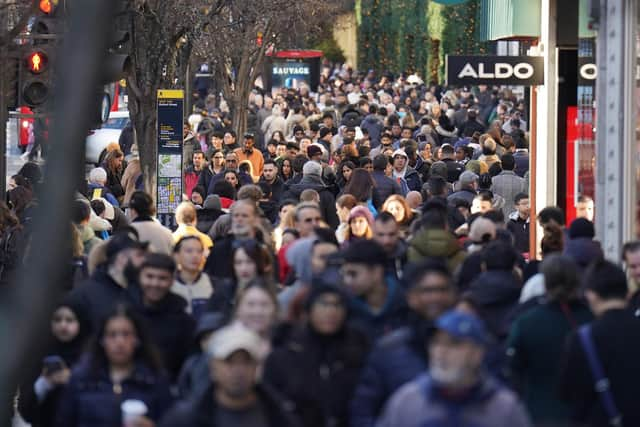Bruising year for retail saw 47 shops shut every day, analysis suggests
More retail sites closed their doors in 2022 than at any other point in the past five years, the Centre for Retail Research (CRR) has found.
It comes as the British Retail Consortium (BRC) warns there may yet be a slow start for retailers through 2023 as customers reel back their spending under rising costs.
Advertisement
Hide AdAdvertisement
Hide AdKris Hamer, director of insight at the BRC, said: "The first half of the year is likely to be challenging for households and retailers.


"Ongoing inflation will make sales appear to be rising, but we expect falling volumes as consumers continue to manage their spending.
"We also don’t see many signs at this stage of retailers’ input costs easing, with energy costs expected to rise by £7.5bn as the government’s Energy Bill Relief Scheme comes to an end in March, putting ongoing upwards pressure on prices."
Analysis by the CRR has found that 17,145 shops closed in 2022 - a rate of around 47 every day.
Advertisement
Hide AdAdvertisement
Hide AdThis was up by nearly 50 per cent on 2021, when 11,449 shops shut.
The group’s survey found that while a little over 5,500 of the shops went under, there were some 11,600 of them that were closed because a larger chain decided to cut its costs.
But the researchers also found there had been a 56 per cent drop in shops being closed because larger retailers – with 10 or more sites – went out of business.
They said that many of the chains that were going to fail already had in recent years. But Joules, McColl’s and TM Lewin among others still went under.
Advertisement
Hide AdAdvertisement
Hide AdCRR director Prof Joshua Bamfield, said: “Rather than company failure, rationalisation now seems to be the main driver for closures as retailers continue to reduce their cost base at pace.”
He said the trend was likely to continue this year, but added that a few “big hitters” could also go under.
The centre said that more than 151,000 retail jobs had been lost in the UK last year, including from online retailers. This was an increase of more than 45,000 on the year before, its findings showed.
The findings come as analysis by the BRC suggests that retail sales will grow between 2.3 per cent and 3.5 per cent in the coming year, picking up in the second half with growth of up to 4.7 per cent compared to one to 2.3 per cent in the first half.
Advertisement
Hide AdAdvertisement
Hide AdThe body outlined that 2022 had been an "exceptionally difficult" year for both consumers and retailers, with supply chain cost pressures, the war in Ukraine, and inflation on an "upwards spiral" with energy and food prices increasing by over 10 per cent towards the end of 2022.
As inflation peaked and the cost-of-living crisis unfolded, total retail sales growth was 2.3 per cent, it found, but once inflation was accounted for these figures actually represented falls.
Despite the picture retailers have faced through a turbulent year and into coming months, experts say the market remains competitive.
“There is cause for optimism in the second half of 2023," concluded Mr Hamer.
Advertisement
Hide AdAdvertisement
Hide Ad“Despite facing huge cost pressures, retailers will continue to do all they can to keep prices affordable for their customers.
"The market remains very competitive, and every retailer will be striving to attract and retain customers as people continue to be discerning in their purchasing decisions.”